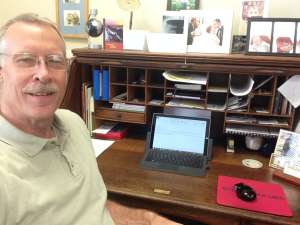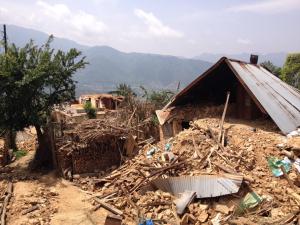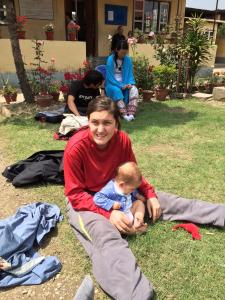the Samaritan’s neighbor (parable-ish)
As a man was journeying from Jericho to Jerusalem he was attacked by thieves. They took everything he had, even the clothes from his back. Then they beat him senseless and left him for dead.
A Samaritan walking on the same road found the man and immediately gave everything he had to dress the man’s wounds and clothe him.
While the Samaritan was nursing the wounded man on the side of the road others passed by.
“You are doing it wrong!” one snarled.
“Mind your own business!” screamed another.
A third journeyman picked up a stick and began beating the Samaritan.
So, I ask you, which of these three was a neighbor to the Samaritan?
The Dogmatic Response to Miracles
For several months I have been thinking about Jesus’ healing of the man born blind (John 9).
The facts are simple. The man was born blind. Jesus gave him sight. This is not a fable. It is not even a parable. It actually happened.
But the rest of the story is about people asking, and dogmatically answering, the wrong questions. The disciples asked a wrong question. The neighbors asked several wrong questions. The Pharisees asked more wrong questions. Even the man healed asked a couple wrong questions.
The questions were understandable, reasonable, properly composed, asked sincerely, and raised by recognized stakeholders in the community – and they were still the wrong questions.
“Who sinned?”
“Isn’t this the same man who used to sit and beg?”
“How, then, were your eyes opened?”
“Where is this man?”
“Who did this on the Sabbath?”
“How can a sinner perform such signs?”
“What have you to say about him?”
“Is this your son?”
“Is this the one you say was born blind?”
“How is it that now he can see?”
“What did he do to you?”
“How did he open your eyes?”
“Why do you want to hear it again?”
“Do you want to become his disciples too?”
After all the wrong questions, Jesus asks the only right question, “Do you believe in the Son of Man?” Jesus asks the question with eternal implications – the question no one else is asking. 
At the end, the Pharisees ask a relevant question, “What? Are we blind too?” But they failed to answer it.
Interestingly, apart from Jesus the only people that didn’t ask wrong questions were the man’s parents. And when they were asked wrong questions, they simply answered, “We don’t know.” It seems like a terribly inadequate answer, but they back it up with facts. “He is our son. He was born blind. How he can see, we don’t know.”
John 9:22 is an interesting verse. It says, “His parents said this because they were afraid of the Jewish leaders, who already had decided that anyone who acknowledged that Jesus was the Messiah would be put out of the synagogue.” Apparently his parents believed the miracle but were intimidated by the threats of the Jewish leaders.
Asking the wrong questions, and answering them dogmatically, is how dogma is reinforced and perpetuated. We can expand the circle of dogmatists, reproduce the circumstances scientifically, lengthen the list of wrong questions, repeat them over and over, publish the answers, and even be drawn into thinking these questions are important and answering them ourselves – and they will still be the wrong questions.
Because God is still performing miracles.
How do you feel about Gay marriage?
Mass media and social media are overflowing with emotions surrounding the decision of the Supreme Court. Visceral feelings are bleeding from all sides, blood pressures are rising, and voices are screaming for the last word. In a battle of feelings everyone is armed and dangerous. It appears that few will emerge without wounds.
As I’ve read the quotes and comments it seems to me that the underlying question is who, or what, has ultimate authority over our lives?
For many, individual feelings have ultimate authority. This is not news. It is not even modern history. It is human nature, and has always been so. It is not an exceptional experience of any minority. It is everyone’s experience. Feeling rise from deep within us, competing for authority in every life. Many choose to follow this personal authority and, understandably, defend the authority of others’ feelings.
For some, majority is authority. That majority may be sitting Supreme Court Justices, a plurality of referendum voters, friends, or family. Democracy is the compass used to navigate life’s choices.
For others, might makes right. Physical strength, weapon sophistication, financial resources, or sheer intimidation carry authority.
Still others choose to follow an external moral standard. They seek to subjugate personal feelings, ignore peer pressure, and stand against powerful opposition. I say “seek to” because all fall short.
All. Fall. Short.
I am not surprised when people whose ultimate authority stands on different foundations disagree. I am not surprised when people question my trust in the Bible as my ultimate moral standard. I am not surprised when people conclude that portions of the Bible which contradict individual feelings, democracy, or power, are obsolete or not authoritative. I expect these disagreements.
I am not surprised when people judge my character based on my commitment to Biblical authority. If I speak or act in hateful ways, I see that hatred condemned in the Bible before it is condemned by anyone around me. If I see people from an ungodly perspective, I need to move closer to God so that I see them as He does. But if my words or actions are criticized or rejected because they respect Biblical authority, I am prepared to accept it. The Author has also been rejected.
I understand the great attraction of feelings, agreement, and power as authorities. At my stage of life I am increasingly aware that my life and legacy will be judged by the generations that follow. My daughters, and sons-in-love, are raising my grandsons in a culture that is far distant from the one in which Jan and I were raised. I expect that this blog will be lost in the blizzard of posts that will accumulate before my grandsons can consider my counsel directly. So, today I offer a word of encouragement to my daughters and sons-in-love.
After the feelings fade, the arguments are won and lost, the majority shifts in yet another direction, and the powers rise and fall, we will each answer to the ultimate Authority. You already know this. Simply speak and act each day, and teach your sons, with Him in mind. His Word is trustworthy, and ultimately we all depend upon His grace and forgiveness.
My “Secret” Mission
When I’m not traveling I spend a significant amount of time at my desk.
It’s a great desk.
When we furnished our office with an office cubicle system I opted instead for antique oak furniture for my office. Jan and I have furnished our home primarily with oak antiques we’ve refinished, so this was another opportunity for us to enjoy working on projects together. It also makes me feel “at home” while I’m “at work.” (The boundaries between these are often blurred, but that’s a subject for another day.)
When anyone comes into my office for a conversation they typically see me sitting in my antique oak office chair, my laptop centered on my roll-top oak desk, with miscellaneous notes, books, and frequently used supplies within easy reach in the oak storage boxes.
Photos of Jan, my daughters and sons-in-love, and grandsons are obvious. If you look very carefully you can see the Family Circus coaster Lindsey got me for Father’s Day one year.
But almost no one sees something that I see all day every day. My “secret” mission. It’s right there in plain sight, if you know where to look. Just above my computer screen. A white sheet of paper tucked into the open space under the storage boxes. Four lines of printing, in large enough font that I can still read it without my glasses (which is now approximately never).
What does it say?
Sorry. I can’t tell you. It’s a “secret”.
Actually, it’s not really a secret. But I shouldn’t have to tell you my mission. It should be obvious – from my actions. If it isn’t obvious, it’s probably not really my mission.
I’m often encouraged that I’m actually accomplishing my mission because people keep connecting with me asking me to do things that are part of my mission. But occasionally people confuse my mission with their mission. That can be awkward for both of us.
So, with only the clues you’ve heard and seen in my life, what do you think my mission is?
This is a test – not for you, but for me.
Fast, or “Too Fast?” (MAST update)
If you were dying today without the gospel, would getting God’s Word today be “too fast?”
 The latest issue of Christianity Today includes an encouraging initial report on the emergence of a new trend that is accelerating Bible translation called MAST (Mobilized Assistance Supporting Translation). I say an “initial” report because MAST is beginning to spread virally within the global church. Today’s report on the mustard seed may be tomorrow’s report on the mustard tree forest!
The latest issue of Christianity Today includes an encouraging initial report on the emergence of a new trend that is accelerating Bible translation called MAST (Mobilized Assistance Supporting Translation). I say an “initial” report because MAST is beginning to spread virally within the global church. Today’s report on the mustard seed may be tomorrow’s report on the mustard tree forest!
The top priority in Bible translation must be accuracy. This was reinforced by everyone mentioned in the article, and accuracy is at the heart of every Bible translation we support at Wycliffe Associates. We should also note that Bible translation accuracy is the top priority for all of the people that are still without scripture in their own language. Sloppy translation serves no one, and no one is more committed to accurate Bible translation than those who have been called by God to translate the Bible for their own people.
MAST emerged because people without Scripture, people with no hope of receiving Scripture from others, decided that in good conscience before God they could no longer wait. Slow Bible translation strategies were not meeting their needs. Their people were dying without hope. So, they took action. In the first MAST project the persecuted community actually mobilized close to 10% of the known Christians in their language group to work together on Bible translation, and the results were tremendous!

Photo sourced from @CTmagazine, https://twitter.com/ctmagazine
Regardless of whether Bible translation takes 20 years or 2 months, it is essential to evaluate the accuracy. As the CT article describes, the MAST strategy includes multiple accuracy checks. During MAST, accuracy checks begin at earlier stages, occur more frequently, and include more involvement of the local church than in many Bible translation methods. As MAST has expanded into more than 100 languages, each typically involving multiple churches and dozens of church leaders, and an expanding group of experienced partners in Bible translation, we have further refined the checking process based on experience and the collective wisdom.
A well-known business principle says that in any human enterprise speed, quality, and cost are always tradeoffs. But Isaiah 55 tells us that God’s ways are “higher”. The Church is absolutely committed to high-quality Bible translation, and they are also unwilling for additional generations to die without God’s Word in their language. They are investing their time, talent, and treasure to speed God’s Word to their families and friends. They are moving forward in faith, trusting God’s strength to overcome their weakness.
For the rest of us, those of us who already have God’s Word in our languages, this opens an unprecedented opportunity for us to serve the global body of Christ with the resources God has entrusted to us. Go to wycliffeassociates.org for information on how you can help assure that no one remains beyond the reach of God’s Word.
Beyond Good Intentions
Some years ago I reported to the board of directors of the ministry where I then served that we could definitively say that we were among the most well-intentioned ministries in the world.
It was not a compliment.
I should also quickly say that in the years immediately following this conversation we managed to both raise our intentions and take action to make them reality.
This week four cancer charities made the news because the gap between their words and actions grew so large that it called their integrity into question. I don’t know the leaders of these charities, or what representations they made regarding their response to cancer, but the public outcry is informative. No one is complaining that their vision was too audacious. No one is complaining that their research or services were ineffective. The complaints are that they were overwhelmingly self-serving.
Serving others is the very definition of charity. It is the absolute minimum requirement.
Integrity requires that our actions match our words. But aiming low in order to guarantee success serves no one. Aiming for an unprecedented impact may reduce the probability of success, but this is how progress occurs. Exerting the faith, energy, and creativity required to achieve unprecedented impact is good stewardship of our lives.
Aim high. Serve others.
Nepali Heartquake
“It’s a heartache… so hard to live. Kill or cure!”
This was the plea of a dear Nepali friend of mine today. It’s hard to hear my friends crying in pain.
After being hammered by the 7.8 earthquake seventeen days ago, this morning they were slammed by another 7.3 earthquake. In between these major quakes they’ve had hundreds of aftershocks.
Most of the aftershocks are physical. But some are spiritual. 
Plate tectonics explains that the Indian subcontinent is subducting under the Eurasian plate, creating the spectacular Himalayas and predictable earthquakes. Not surprisingly, explanations of plate tectonics are small comfort to the people that live there.
Nepal is a country of spiritual people. Nepal is the birthplace of Siddhartha Gautama, more popularly known as Buddha. The largest majority of Nepalis identify themselves as Hindu. There are small minorities of Muslims, Sikhs, and Christians. Only around one-half percent of Nepalis describe themselves as “non-religious”.
In the days immediately following the April 25, 2015 earthquake there were a number of news reports describing the spiritual interpretations of the cataclysm by the local people. The most frequent interpretation was that Nepalis had angered the gods by their unfaithfulness.
Hopefully Christians are looking at these, and similar, events through the lens of scripture.
“We know that the whole creation has been groaning as in the pains of childbirth right up to the present time. Not only so, but we ourselves, who have the firstfruits of the Spirit, groan inwardly as we wait eagerly for our adoption as sons, the redemption of our bodies.” Romans 8:22-23
My Nepali friend is right. The events in Nepal are heartaches. There is only one eternal cure.
I groan with them, and can only respond with compassion. You can too. http://goo.gl/f9SvFa
Filthy Rags on My Lens
These days the conversations on social media often reflect the collision of political and religious values. Writers on all sides, with much more notable names than mine, are predicting the imminent apocalyptic end of life as we have known it. Some cheer this end as an indication of the triumph of human enlightenment and justice. Others see today’s trends as the accelerating degradation of human kind. One, both, or neither, may be true.
I’m not saying that these issues are not important. I’m also not saying that I don’t have a personal view on the issues of the day. What I am saying is that there is another perspective on these issues that I have not seen in the dialog.
I appreciate that others are arguing in the public arena for values that I hold. But my values are not decided by the latest poll, by the popular majority, or even by the Supreme Court. When someone with contradictory values comes knocking at my door I’m not likely to make the news. But I do have to make choices about how I relate to people that think and act differently than I do. All of us have to make these decisions, and our choices are weighed in the changing balance of civil and criminal law.
I also believe that all of us, including me, fall short of God’s unchanging standards. All. Fall. Short.
I recognize that not everyone believes in God or standards that supersede our own. But since I do, I see others through this lens. The standard I rely on says that all my righteous acts are like filthy rags. Filthy. Rags.
If I ignore my own filthy rags it is easier for me to be offended and critical of the filthy rags of others. I suspect that others have the same experience as they look at me.
But when I look at the filthy rags of others through the lens of my own filthy rags all I see is… filthy rags. I will admit that I am much more comfortable with my own filthy rags than with the filthy rags of others. But that doesn’t make my filthy rags clean in God’s eyes. Comparing rag filth is a popular sport, but ultimately pointless. All. Fall. Short.
According to the standard I rely on, my righteousness and yours, is completely contingent on God’s grace and forgiveness. The good news for all of us is that God sent His son, Jesus, to pay our immeasurable debt of sin.
It’s unfortunate that bad news, bad behavior, and bad attitudes get better media coverage than good news.
Did you feel it? (5/2 Nepal Earthquake Update)
You heard about the earthquake in Nepal. You saw the photos and videos.
But did you feel it? Did it move you?
I’m grateful that our friends and ministry partners in Nepal were not physically injured by the earthquake or numerous aftershocks. But they spent most of this week outside as the damage to buildings was evaluated. That meant sleeping outside, on the ground, under improvised tarps, in the cold rain. Communicating with friends and family, inside and outside Nepal, has been difficult. Dividing attention between taking care of their own families, responding to the needs of their neighbors, and resuming the priorities of life has been challenging for them.
On the opposite side of the planet it has been interesting to observe the range of responses. On Monday it seemed that every nonprofit, every business, and every individual was focused on Nepal. At the end of the week I received a message from a ministry clarifying that they are not planning any response to the events in Nepal.
During a midweek interview a Christian journalist asked me why Wycliffe Associates is involved in responding to the earthquake. The answer is simple.
We care about the people of Nepal.
We cared about them before the earthquake. We have friends and ministry partners there. I have traveled there multiple times personally. We have had staff, volunteers, and partners there for several years. We had teams and projects underway in Nepal the day the earthquake hit. We are committed to helping all of the people groups there to have God’s Word in their language. This is a long-term relationship and commitment for us.
“If a brother or sister is poorly clothed and lacking in food, and one of you says to them, ‘Go in peace, be warmed and filled,’ without giving them the things needed for the body, what good is that? So also faith by itself, if it does not have works, is dead.” James 2:15-17
When a tragedy happens to people you care about you cannot stand idly by. You cannot say, “It’s not my job.” I will not say, “Be warmed and filled.” The very same neglected rural minority groups that we work with are in danger of being overlooked, again, by the response to the urban masses.
We are working to assure that no one is beyond the reach of human compassion, Christian love, or God’s Word.
Let the Spirit move you.
http://www.wycliffeassociates.org
Nepal Earthquake: 5/1 Update
Providing food and tents for a community to the north of Kathmandu. In this community, 98 of the over 140 houses were destroyed by the Nepal Earthquake, according to the local contact with whom we have a relationship. The Wycliffe Associates + Translation Movement Nepal team is on the move right now! Thank you for the resources. To help more people devastated by the quake and to support the Bible translation work taking place, visit the Wycliffe Associates website.
-
Follow Wycliffe Associates on Facebook
-
Recent Posts
Wycliffe Associates Tweets
Tweets by wycliffeassocArchives
- October 2015
- August 2015
- June 2015
- May 2015
- April 2015
- March 2015
- February 2015
- January 2015
- December 2014
- November 2014
- October 2014
- September 2014
- August 2014
- July 2014
- June 2014
- May 2014
- April 2014
- March 2014
- February 2014
- January 2014
- December 2013
- November 2013
- October 2013
- September 2013
- August 2013
- July 2013
- May 2013
- April 2013
- March 2013
- February 2013
- January 2013
- November 2012
- October 2012
- September 2012
- August 2012
- June 2012
- May 2012
- April 2012
- March 2012
- February 2012
- January 2012



